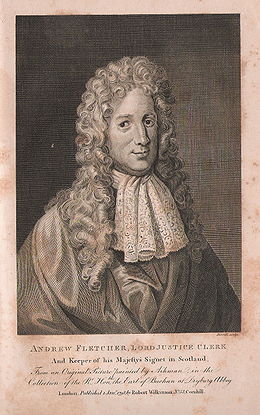Andrew Fletcher (politician)
Andrew Fletcher of Saltoun was a Scottish writer and politician, remembered as an advocate for the nonincorporation of Scotland, and an opponent of the 1707 Act of Union between Scotland and England. Fletcher became an exile after being accused of promoting insurrection. He was appointed the cavalry commander of the Monmouth Rebellion, but shortly after landing in England he killed another leading figure. He again went into exile, this time as a fugitive and with his estates forfeit. He returned with William of Orange, becoming Commissioner of the old Parliament of Scotland.
Andrew Fletcher was the son and heir of Sir Robert Fletcher , and was born at Saltoun in East Lothian. Educated by Gilbert Burnet, the future Bishop of Salisbury, who was then minister at Saltoun, he completed his education in mainland Europe. Fletcher was elected, as the Commissioner for Haddingtonshire, to the Scottish Parliament in 1678. At this time, Charles IIs representative in Scotland was John Maitland, 1st Duke of Lauderdale. The Duke had taxation powers in Scotland, and maintained a standing army there in the name of the King. Fletcher bitterly opposed the Duke, whose actions only strengthened Fletchers distrust of the royal government in Scotland, as well as all hereditary power. In 1681, Fletcher was reelected to the Scottish Parliament as member for Haddingtonshire. The year before, Lauderdale had been replaced by the Duke of Albany. At this time, Fletcher was a member of the opposition Country Party in the Scottish Parliament, where he resolutely opposed any arbitrary act
Source: Wikipedia

